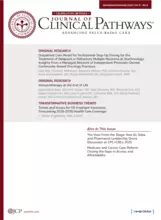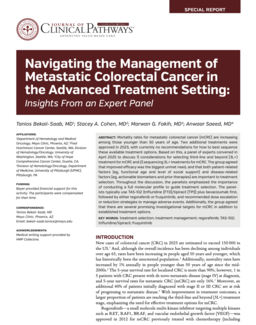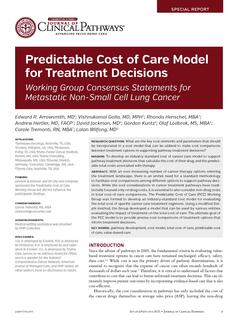Author Guidelines
The Journal of Clinical Pathways (JCP) is published in conformance with the Principles of Transparency and Best Practice in Scholarly Publishing. Manuscripts are accepted for publication in JCP with the understanding that their content, all or in part, has not been published elsewhere and will not be published elsewhere, except in abstract form or by the express consent of the Director.
Policies on Conflict of Interest, Human and Animal Rights, and Informed Consent
The author is responsible for the contents submitted in the paper. Authors must comply with FDA guidelines, human studies guidelines, and animal welfare regulations of the authors’ institution.
Patients have a right to privacy that should not be violated without informed consent. Identifying information, including names, initials, or hospital numbers, should not be published in written descriptions, photographs, or pedigrees unless the information is essential for scientific purposes and the patient (or parent or guardian) gives written informed consent for publication. Authors should include signed consent forms with their submissions from human subjects who can be identified in photos or in text and indicate in the paper that human subjects have given informed consent. Any instances of research and publication misconduct will be handled in accordance with the Committee on Publication Ethics (COPE) guidelines.
Authors should note if and from where Institutional Review Board (IRB) approval was received for their work. If the work did not require IRB approval, the circumstances under which the study was exempt from IRB approval should be noted.
Opinions expressed by authors are their own and not necessarily those of HMP, the editorial staff, or any member of the editorial advisory board. No claims made by authors or advertisers are guaranteed by the publisher or the editors.
Editorial Policies
Authors interested in submitting to JCP should follow the ICMJE Recommendations for the Conduct, Reporting, Editing, and Publication of Scholarly Work in Medical Journals. All articles submitted to JCP must be original; the journal does not accept manuscripts whose content has been previously published elsewhere, in print or online.
Manuscripts may be submitted online. Authors should fill out the requested information and then upload their manuscript and supporting files (Cover Letter, Author Disclosure forms, Copyright form) in the required formats.
Plagiarism is defined as the misappropriation of language, ideas, or thoughts of another without attributing proper credit, or obtaining permission, to use the published or unpublished source material and representing the work as one's own.1,2 JCP uses iThenticate to verify the originality of manuscripts submitted for consideration.
By submitting your manuscript to JCP, you agree to a plagiarism screening via iThenticate. All submissions will be screened for plagiarism before being reviewed by a peer-review panel.
- World Association of Medical Editors (WAME). Recommendations on Publication Ethics Policies for Medical Journals. World Association of Medical Editors. Accessed April 10, 2022. https://wame.org/recommendations-on-publication-ethics-policies-for-medical-journals
- Committee on Publication Ethics (COPE). Accessed April 10, 2022. https://publicationethics.org/
To facilitate blind peer-review of manuscripts, please do not include author names, affiliations, or contact information in the submitted manuscript document. Please provide this information separately in the Cover Letter submitted with the manuscript. The manuscript as well as the Cover Letter should be submitted as Microsoft Word files.
Disclosures of funding sources and financial conflicts of interest must be provided for all authors at the time of manuscript submission. Each author must complete and sign an Author Disclosure form. As a matter of editorial policy, we will not publish manuscripts that have been written by, or whose development was funded by, a pharmaceutical company, public relations agency, or similar outside source without full disclosure.
Authors must submit a completed Copyright Release form shortly after submission.
Authors are responsible for obtaining permission and paying fees to reproduce any tables, figures, or other illustrations that were originally published elsewhere; written documentation of this permission should be submitted with the manuscript.
For photographs in which patients are identifiable, authors must include a signed Patient/Parent Consent form. Permission and Consent forms can be requested via email at: JCPeditors@hmpglobal.com.
Manuscript Formatting
On the title page of the manuscript, please provide a title and up to six keywords for your article. An abstract of 100–175 words should be included in the manuscript document. It should be factual, not descriptive, and outline the main points of the paper. Manuscript text should be should be 500–3000 words in length, not including the Abstract and References.
Values should be reported using conventional units of measure. All medications should be referred to by their generic names throughout the manuscript and in all illustrations.
All references should be cited in full and provided in American Medical Association (AMA) style. Please do not use EndNote formatting, as this makes editing difficult. References should be cited in chronological order in the text using superscripted Arabic numerals and included in a citation list at the end of the article.
Tables and figures that reflect the general subject matter of the article are encouraged and should accompany the manuscript when first submitted (preferably in their original Word, Excel, or PowerPoint formats).
For print-ready figures and photos, high-resolution (300 dpi, 4" x 5") JPEG images are preferred. Other acceptable image formats include EPS, PICT, BMP, and TIFF. Please submit images separately from Microsoft Word files. All graphics should be numbered in proper sequence. Legends should be included in the manuscript document.
Article Types
JCP accepts for consideration the following types of manuscripts: Research Report, Review, From the Field, Case Study, Perspectives, Viewpoint, and Letter to the Editor.
- Research Reports are reports of original research pertaining to health economics and outcomes research, clinical pathway development, the evaluation of real-world data, and other investigations related to determination of value in health care.
- Review articles provide a thorough, critical, up-to-date overview of the existing literature on a topic relevant to the journal’s mission.
- From the Field articles should present timely information on new methods being used to provide value-based care. These articles should have a practical focus and should provide sufficiently detailed information that the reader can implement the approach in their own setting.
- Case Studies should present real-world outcomes of using clinical pathways and other value-based treatment approaches in a particular setting. These articles should include detailed information about the approach that was used as well as the methods for evaluating outcomes.
- Perspectives articles are less formal in style and should provide unique and evidence-based insights into issues pertaining to the use of clinical pathways and the pursuit of value-based care.
- Viewpoints and Letters to the Editor include opinions and commentaries on topics of interest to JCP readers. Letters to the Editor should be written in response to a particular article appearing in a previous issue of the journal or on the JCP website. These submissions are evaluated by at least one expert reviewer prior to acceptance. The Editors reserve the right to decide whether these submissions require full peer review and may invite a response from another contributor to present a counterpoint to the piece.
Peer Review Process
All manuscripts submitted to JCP are initially screened by the Editors to assess their quality, relevance, and alignment with the journal’s scope. Submissions that meet these preliminary criteria are then advanced to the journal’s rigorous double-blinded peer review process.
In this process, the identities of both the reviewers and the authors are concealed to ensure objectivity and fairness. Each manuscript is evaluated by at least two independent experts, who provide critical feedback on the scientific accuracy, originality, and clinical relevance of the work.
Authors can typically expect to receive an editorial decision within 6 to 8 weeks of submission. In many cases, reviewers or Editors may request revisions to enhance the manuscript's clarity, data integrity, or adherence to journal standards. A final decision regarding acceptance is rendered only after the revised manuscript has been thoroughly reassessed.
Once accepted, manuscripts undergo professional copyediting in accordance with AMA style and the journal’s house guidelines. The corresponding author will have the opportunity to review the edited manuscript before it proceeds to publication.
All accepted articles are published in print and subsequently made available on the JCP website, ensuring wide visibility and accessibility within the clinical community.
Corrections and Amendments Policy
JCP is committed to upholding the quality of its published content and the integrity of its peer review process. While we strive for the highest standards, we acknowledge that, on occasion, corrections or retractions may be necessary. In addressing these situations, JCP adheres to recognized best practices and follows guidance from leading organizations such as the ICMJE and COPE. Further details on our policies and procedures are outlined below.
Author Corrections
Authors who identify significant errors in their published work should promptly contact the journal via JCPEditors@hmpglobal.com as soon as possible. using the information on the homepage. The corresponding authors should clearly communicate the error(s) and if new data/information can or will be provided. The JCP editorial team, including the Editor in Chief, Director, and members of the Editorial Board with applicable expertise, will review the published article and the information from the authors to decide the appropriate approach to rectify the error.
Expressions of Concern
If a revision or correction will be undertaken and may take some time and may involve further peer review (for example, if it is a data error or other fundamental error that may require a significant revision to the article by the authors), JCP will publish an Expression of Concern to alert its readership that the article is being evaluated to correct a substantial error. The authors will be responsible for the additional research and revisions to the article, and will have to address any comments from the additional peer review process.
If a revision or correction will be undertaken that is relatively minor and easy to fix (for example, a typo that changed the interpretation of a finding), JCP will fix it immediately in the online version of the article and will add a note that the article has been revised, with details about the revision and the date of the revision. A formal correction notice will then be published in the next available issue of JCP. The authors will approve the revised article and the correction notice for accuracy prior to publication.
Corrigenda and Errata
Notices will be labeled as corrigendum if it was an error introduced during the editing or production process after submission.
Notices will be labeled as erratum if it was an error present in the initial submission (data or otherwise).
Retractions
If the JCP Editorial team determines that retraction is the most appropriate course of action—guided by ICMJE, COPE, and other established best practices—they will collaborate with the authors to prepare a formal retraction notice. This notice will be published online without delay, making the retraction effective immediately, and will also appear in the next available print issue of JCP. The online article will be clearly marked as retracted, including the date of retraction, and appropriate steps will be taken to ensure that indexing services and databases reflect the article’s retracted status..
Reader-Identified Errors
If a reader believes they have found a substantive error in a JCP article, they should contact JCPEditors@hmpglobal.com as soon as possible with the article DOI, title, and the nature of the error they believe they have found and as many additional details as possible. The JCP editorial team, including the Editor in Chief, Director, and members of the Editorial Board with applicable expertise, will review the information.
If they agree with the reader or cannot determine the accuracy of the information, they will reach out to the authors either to request a response, a revision, or to ask the authors to address the reader concerns and explain if there was a misunderstanding or if a correction is needed.
If it was a misunderstanding or can be easily explained, the reader and authors may be invited to formally document this discussion as a Letter to the Editor and a Response Letter from the authors.
If it is determined there is an error, the remainder of the process will follow the steps outlined in the previous section.
Pre-Print Server Policy
JCP will consider manuscripts that have been posted on preprint servers as long as they are posted to the preprint server prior to submission. These submissions should follow our other guidelines, and in the cover letter the authors must mention and provide a URL and/or DOI for the preprint version of the manuscript. The submission will go through our standard editorial evaluation and peer review processes as outlined above; if accepted, the preprint version must link to the final, published version of record at JCP once it is available.
Policy on Use of AI in Manuscripts
- AI tools cannot be listed as authors of manuscripts. They do not meet the ICMJE requirements for authorship.
- Authors are responsible for the accuracy and integrity of the content and data within their manuscript, including any sections/references generated by AI tools.
- Authors may use tools such as grammar and spell check that are built into word processing programs and do not need to declare the use of such tools.
- All other uses of other types of AI tools must be declared in the manuscript:
- Use of AI tools to help with writing of the manuscript must be mentioned in the Acknowledgments, detailing the specific tools used (and version, if applicable) and in which sections of the manuscript these tools were used.
- Use of AI tools to help with data analysis or other fundamental aspects of the research in the manuscript must be described in detail in the Materials and Methods, Methods, or other applicable section of the manuscript. This includes a comprehensive description of what tool (and version, if applicable), how it was utilized, and how the information was verified by the authors.
- The journal does not permit the use of AI-generated images or videos in submitted manuscripts, including but not limited to figures, illustrations, radiological images, histological slides, and visual abstracts. This policy is intended to uphold the integrity, reproducibility, and accuracy of the visual content presented in scientific work.
- An exception may be made when the manuscript's primary focus is on artificial intelligence itself, and the AI-generated visual content is directly relevant to the subject matter under discussion. In such cases, the images or videos will be subject to editorial review and evaluated on a case-by-case basis to ensure appropriateness, transparency, and scientific rigor.
- Authors must clearly disclose when any visual content has been generated or modified using AI tools and provide details regarding the method, model, and data used to produce the content.
Advertising Policy
While revenue for JCP is ad-based, editorial content is evaluated and published independent from advertising influence.
Free to Submit/Free to Read
No fees or charges are required for manuscript processing and/or publishing materials in the journal. No fees or charges are required to view online articles.
Want to submit to the Journal of Clinical Pathways?
All articles must be uploaded through our online submission system at: https://www.editorialmanager.com/jclinpath/default2.aspx. If you do not have an author account in our system, you will be required to make one. Please proceed to the "Register" link in the top header. If you already have an author account, you may proceed directly to "Login" in the top header. Authors who have lost or forgotten their login credentials should use the "Send Username/Password" link. Once logged in, click the "Submit New Manuscript" link and follow the instructions.













